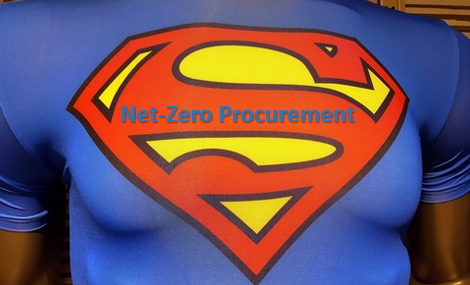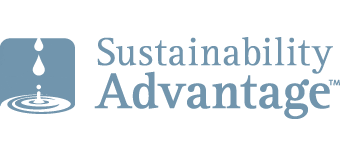3 Superpowers of Net-Zero Procurement

Net-Zero Procurement is an untapped super market force that could save the day for humankind, or at least fix climate change. Net-Zero Procurement (N-ZP) is defined as obtaining the best value for money when purchasing the most climate-friendly goods and services from suppliers who are the most committed to science-based net-zero greenhouse gas (GHG) targets, in support of the buyer’s / customer’s stated organizational purpose and strategic net-zero goals. There are 3 superpowers of Net-Zero Procurement.
1. Disclosure superpower: All suppliers must disclose their progress on net-zero targets
The recent EcoVadis “Carbon Maturity Report 2022” revealed that only 20% of large companies (companies with over 500 employees) have reduction targets for either their operational Scope 1 GHG emissions or their Scope 2 GHG emissions from their electrical utilities. Further, only 10% of large companies have reduction targets for their Scope 3 GHG emissions from other sources in their value chain. For medium-size companies (100-500 employees), only 5% have reduction targets for their Scope 1 and Scope 2 GHG emissions, and only 2% have reduction targets for their Scope 3 emissions. For small companies (less than 100 employees), which constitute 98% of the companies on the planet, less than 2% have reduction targets for any GHG emissions. This lack of engagement by the business community in fixing climate change is not acceptable.
The Intergovernmental Panel on Climate Change (IPCC) has warned that the average global temperature is already 1.2˚C above pre-industrial levels. To avoid devasting impacts on human civilization, we must stay under 1.5˚C. We are on track to be at 1.5˚C by 2030 and over 3˚C by 2100. The IPCC has unequivocally declared that to stay under 1.5˚C, we must reduce GHG emissions 50% by 2030 and 100% (net-zero) by 2050. Without those GHG reductions by the business community, governments cannot fix climate change and meet their climate-related pledges. The first step is to have companies at least self-assess where they are on science-based net-zero targets, so that they have a baseline against which to compare their reductions.
In an N-ZP system, all suppliers, regardless of size or sector, must disclose their net-zero GHG performance. The disclosures include their current Scope 1, 2, and 3 GHG inventories, their commitment to science-based net-zero targets, and their plans to reach those time-based targets. A short, reasonable questionnaire ‒ like the free, open-source Net-Zero Assessment Tool (N-ZAT) ‒ is used by small- or medium-size enterprises (SMEs) who do not have the benefit of in-house sustainability staff or expertise. Suppliers’ verified scores are appended to their profiles in the buyer’s supplier database. Registered suppliers can update their scores in their profiles at any time. Unregistered suppliers are required to complete the questionnaire and disclose their scores as part of their response to any RFP.
Why would a supplier bother making theses net-zero disclosures? Because their customer / buyer requires them to. If a supplier chooses not to complete the questionnaire, they are not eligible to be a supplier. It’s their choice. That’s the magic in the disclosure superpower of N-ZP: it’s voluntary and it’s easy.
2. Incentive superpower: Suppliers with the best net-zero scores receive preferential treatment
N-ZP gives preferential treatment to suppliers who are committed to science-based, net-zero GHG emission reduction targets. All RFPs assign a weight of 10%-30% – enough to make it matter – to supplier’s net-zero assessment scores. For example, if the weight assigned to suppliers’ net-zero score were 20% and a supplier’s overall score on the net-zero assessment questionnaire was 68%, the supplier would earn 13.6% of the 20% weight.
The heavy weight given in the bid appraisal to supplier net-zero performance incentivizes suppliers’ efforts to attain science-based net-zero targets, improve their scores, and earn preferential treatment over their competitors. The incentive superpower is the most important of the three. It rewards suppliers who are most committed to science-based net-zero targets. It makes their net-zero performance matter.
3. Commitment superpower: The buyer contracts with suppliers to take action to meet net-zero targets.
Winning suppliers are required to commit to action plans to achieve net-zero targets, as part of their contracts with the buyers. They are required to be transparent about their net-zero performance and commitments by including them on their websites. They may also be required to tie CEO compensation to meeting their net-zero targets. The penalties for not completing their action plans may vary, but they are severe enough to ensure suppliers follow through on them. This superpower is the teeth in a N-ZP system.
These three superpowers unleash Net-Zero Procurement as a market force that mobilizes the business community in the race to net-zero. Stay tuned for how we can scale it quickly to meet our net-zero targets globally, in time.
Please feel free to add your comments and questions using the “Leave a reply” comment box under the “Share this entry” social media symbols, below. For email subscribers, please click here to visit my site and provide feedback.



